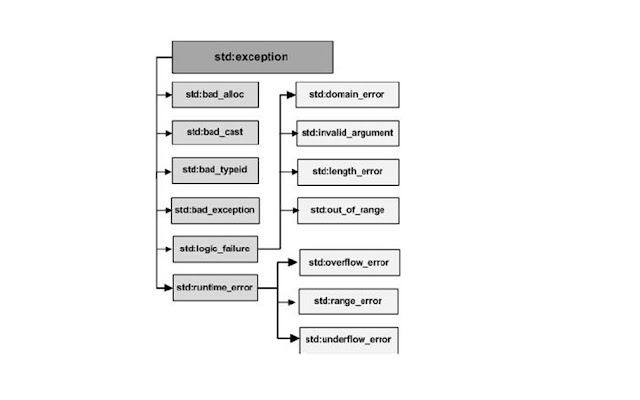DIFFERENT EXCEPTIONAL HANDLING PROGRAMS
BAD-ALLOC EXAMPLE:-
// bad_alloc
example
#include
<iostream> // std::cout
#include
<new> // std::bad_alloc
int main () {
try
{
int* myarray= new int[10000];
}
catch (std::bad_alloc& ba)
{
std::cerr << "bad_alloc caught:
" << ba.what() << '\n';
}
return 0;
}
BAD-CAST EXAMPLE:-
// bad_cast
example
#include
<iostream> // std::cout
#include
<typeinfo> // std::bad_cast
class Base
{virtual void member(){}};
class Derived :
Base {};
int main () {
try
{
Base b;
Derived& rd =
dynamic_cast<Derived&>(b);
}
catch (std::bad_cast& bc)
{
std::cerr << "bad_cast caught:
" << bc.what() << '\n';
}
return 0;
}
BAD-EXCEPTION EXAMPLE:-
//Exception
Handling: Use of built-in exception class
#include<iostream>
#include<exception>
//header file of exception class
using namespace
std;
int main()
{
int *a;
long n;
cout<<"\nEnter no. of
values:";
cin>>n;
try
{
a = new int[n]; //exception will be
thrown by default if the n exceeded memory limit
cout<<"Array created in
memory for "<<n<<" elements.";
delete a;
}
catch(bad_alloc e) //or catch (exception
e)
{
cout<<"\n** Error:
"<<e.what();
}
}
INVALID-ARGUMENT EXAMPLE:-
//
invalid_argument example
#include
<iostream> // std::cerr
#include
<stdexcept> //
std::invalid_argument
#include
<bitset> // std::bitset
#include
<string> // std::string
int main (void) {
try {
// bitset constructor throws an
invalid_argument if initialized
// with a string containing characters
other than 0 and 1
std::bitset<5> mybitset
(std::string("01234"));
}
catch (const std::invalid_argument& ia) {
std::cerr << "Invalid argument: " << ia.what()
<< '\n';
}
return 0;
}
STANDARD EXCEPTION EXAMPLE:-
// standard exception
#include
<iostream>
#include
<exception>
using namespace
std;
int main () {
try
{
int* myarray= new int[1000];
}
catch (exception& e)
{
cout << "Standard exception:
" << e.what() << endl;
}
return 0;
}
LENGTH ERROR EXAMPLE:-
// length_error
example
#include
<iostream> // std::cerr
#include
<stdexcept> //
std::length_error
#include
<vector> // std::vector
int main (void) {
try {
// vector throws a length_error if resized
above max_size
std::vector<int> myvector;
myvector.resize(myvector.max_size()+1);
}
catch (const std::length_error& le) {
std::cerr << "Length error: " << le.what()
<< '\n';
}
return 0;
}
LOGICAL ERROR EXAMPLE:-
//range error
when input value a=
#include<iostream>
using namespace
std;
int main()
{
int a, b, c;
cout<<"\nEnter two numbers:
";
cin>>a>>b;
try
{
if(b==0) throw 0;
c = a/b;
cout<<"\nDivision result
is: "<<c;
}
catch(int)
{
cout<<"\nError: out of range of integer";
}
}
OUT OF RANGE EXAMPLE:-
// out_of_range
example
#include
<iostream> // std::cerr
#include
<stdexcept> //
std::out_of_range
#include
<vector> // std::vector
int main (void) {
std::vector<int> myvector(10);
try {
myvector.at(20)=100; // vector::at throws an out-of-range
}
catch (const std::out_of_range& oor) {
std::cerr << "Out of Range
error: " << oor.what() << '\n';
}
return 0;
}
RUN-TIME ERROR:-
//Basic Use of
try-catch
#include<iostream>
using namespace
std;
int main()
{
int a, b, c;
cout<<"\nEnter two numbers:
";
cin>>a>>b;
try
{
if(b==0) throw 0;
c = a/c;
cout<<"\nDivision result
is: "<<c;
}
catch(int)
{
cout<<"\nError: Divide by Zero";
}
}
EXCEPTION MULTIPLE CATCH BLOCKS:-
//Exception
handling: Multiple catch blocks
#include<iostream>
using namespace
std;
int main()
{
int a, b, c;
cout<<"\nEnter two numbers:
";
cin>>a>>b;
try
{
if(a==0 and b==0) throw (float)0;
if(b==0) throw (int)0;
c = a/b;
cout<<"\nDivision result
is: "<<c;
}
catch(int)
{
cout<<"\nError: Divide by Zero: Result is INFINITY";
}
catch(float)
{
cout<<"\nError: Divide by Zero: Result is NaN";
}
}
SINGLE CATCH BLOCK EXAMPLE TO HANDLE MULTIPLE ERROR:-
//Exception
handling: single catch block to handle multiple errors using error codes
#include<iostream>
using namespace
std;
int main()
{
int a, b, c;
cout<<"\nEnter two numbers:
";
cin>>a>>b;
try
{
if(a==0 and b==0) throw 2;
if(b==0) throw 1;
c = a/b;
cout<<"\nDivision result
is: "<<c;
}
catch(int&
errorcode) //can also work without &
{
if(errorcode==1)
cout<<"\nError: Divide by Zero: Result is INFINITY";
else
cout<<"\nError: Divide by Zero: Result is NaN";
}
}
USE OF BUILT-IN EXCEPTION CLASS:-
//Exception
Handling: Use of built-in exception class
#include<iostream>
#include<exception>
//header file of exception class
using namespace
std;
int main()
{
float a, b;
cout<<"\nEnter two
numbers:";
cin>>a>>b;
try
{
if(b==0) throw exception();
cout<<"Division is
"<<a/b;
}
catch(exception e)
{
cout<<"\n** Error:
"<<e.what();
}
}
USER-DEFINED EXCEPTION CLASS:-
//Exception
Handling: user-defined exception class
#include<iostream>
#include<exception>
//header file of exception class
using namespace
std;
class DivByZero:
public exception
{
public:
//override the what function
declared in exception class with header as:
//
virtual const char* what() const throw() { }
//or simply with th header as under:
char* what()
{
return "Divide by Zero."; //error
message that you want to send
}
};
int main()
{
float a, b;
cout<<"\nEnter two
numbers:";
cin>>a>>b;
try
{
if(b==0) throw DivByZero();
cout<<"Division is
"<<a/b;
}
catch(DivByZero e)
{
cout<<"\n** Error:
"<<e.what();
}
}
EXCEPTIONAL HANDLING PROGRAMS
 Reviewed by Marketing Thrills
on
September 07, 2015
Rating:
Reviewed by Marketing Thrills
on
September 07, 2015
Rating:
 Reviewed by Marketing Thrills
on
September 07, 2015
Rating:
Reviewed by Marketing Thrills
on
September 07, 2015
Rating:





1 comment:
ITS VERY HELP FULL
Post a Comment